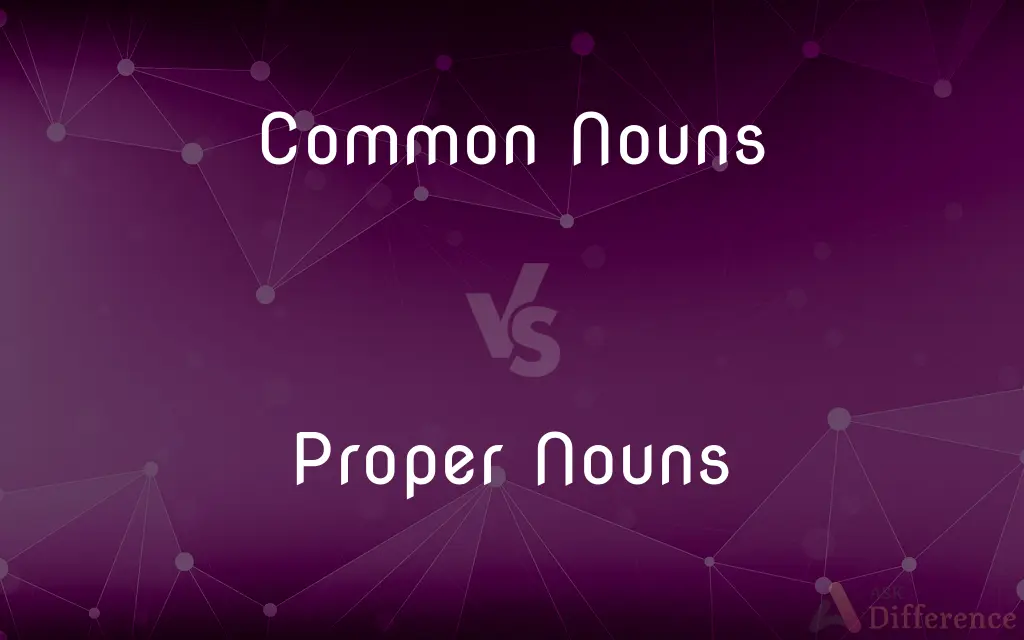Common Nouns vs. Proper Nouns — What's the Difference?
By Tayyaba Rehman — Published on December 29, 2023
Common Nouns refer to general items or concepts, not specific ones, while Proper Nouns name specific entities and are usually capitalized.

Difference Between Common Nouns and Proper Nouns
Table of Contents
ADVERTISEMENT
Key Differences
Common Nouns and Proper Nouns are fundamental categories in English grammar. A Common Noun refers to a general category or class of entities without specifying a particular one. On the other hand, a Proper Noun distinctly points out individual entities or specific members of a class.
For instance, in the realm of Common Nouns, the term "city" can represent any city in the world without zeroing in on a particular one. Conversely, Proper Nouns such as "New York" or "Paris" identify specific cities with unique identities.
One can easily spot the distinction between Common Nouns and Proper Nouns by observing capitalization. In English, Proper Nouns are typically capitalized, regardless of where they appear in a sentence, emphasizing their specific nature. However, Common Nouns are usually not capitalized unless they begin a sentence.
When discussing the nuances of the two, it's essential to note that Common Nouns can be preceded by articles like "a", "an", or "the". Proper Nouns, in contrast, often stand alone without articles, although there are exceptions.
To elucidate further, while "mountain" is a Common Noun and can describe any mountain, "Mount Everest" is a Proper Noun that denotes a specific mountain. Hence, understanding the difference between Common Nouns and Proper Nouns helps in both written and spoken English.
ADVERTISEMENT
Comparison Chart
General vs. Specific
Represent a general class of items or concepts
Name specific entities
Capitalization
Typically not capitalized unless at the start of a sentence
Always capitalized
Use of Articles
Can be used with articles like "a", "an", or "the"
Often do not need articles, but exceptions exist
Examples
Dog, city, mountain
Rover, New York, Mount Everest
Countability
Can be countable or uncountable
Usually uncountable, as they represent uniqueness
Compare with Definitions
Common Nouns
Generic terms not specific to one entity.
The dog chased its tail around the yard.
Proper Nouns
Represent individual entities within a general class.
Mars is farther from the Sun than Earth.
Common Nouns
Not unique to a particular entity.
The river flows gently through the valley.
Proper Nouns
Names that refer to specific and unique entities.
Jane is my closest friend.
Common Nouns
Can be tangible or intangible entities.
Love is a powerful emotion.
Proper Nouns
Specific names for places, people, organizations, etc.
Apple Inc. is a renowned tech company.
Common Nouns
Refers to any member of a group.
The city has grown rapidly in the last decade.
Proper Nouns
Always capitalized in English.
We visited London last summer.
Common Nouns
Typically lowercase unless they start a sentence.
Cars are becoming more electric.
Proper Nouns
Unique identifiers within their categories.
The Grand Canyon is a breathtaking sight.
Common Curiosities
Can Common Nouns be capitalized?
Common Nouns are typically not capitalized unless they are at the beginning of a sentence.
Give an example of a Common Noun and a Proper Noun.
An example of a Common Noun is "city", and a corresponding Proper Noun would be "Chicago".
Why are Proper Nouns always capitalized?
Proper Nouns are capitalized to signify their specificity and uniqueness within their category.
Is "book" a Common Noun or Proper Noun?
"Book" is a Common Noun. If referring to a specific book title, such as "The Great Gatsby", it becomes a Proper Noun.
What are Common Nouns?
Common Nouns are words that refer to general categories or classes of entities, not specific ones.
How do Proper Nouns differ from Common Nouns?
Proper Nouns name specific entities and are always capitalized, while Common Nouns refer to general items or concepts.
Can Proper Nouns ever be used with articles like "a" or "the"?
Often, Proper Nouns do not require articles, but there are exceptions, such as "The Beatles".
Are all Proper Nouns unique?
Proper Nouns represent unique entities within their categories, but different categories might have the same Proper Noun (e.g., Jordan the country and Jordan the basketball player).
Are all Proper Nouns capitalized?
Yes, Proper Nouns are always capitalized in English.
Can Common Nouns become Proper Nouns?
Yes, when a Common Noun is used as a specific name or title, it can become a Proper Noun. For instance, "apple" (fruit) vs. "Apple" (company).
Is "winter" a Common Noun or Proper Noun?
"Winter" is a Common Noun. However, if used in a title like "Winter Wonderland", it acts as a Proper Noun.
How can one easily distinguish between Common Nouns and Proper Nouns?
One can distinguish by observing capitalization and understanding if the noun is referring to a general category or a specific entity.
Can Proper Nouns be pluralized?
Yes, some Proper Nouns can be pluralized, like "The Smiths" referring to the Smith family.
Are days of the week Common Nouns or Proper Nouns?
Days of the week, like "Monday" or "Friday", are Proper Nouns and are capitalized.
Can one Common Noun represent various Proper Nouns?
Yes, a Common Noun like "country" can represent various Proper Nouns like "France", "India", or "Canada".
Share Your Discovery

Previous Comparison
Job vs. Undertaking
Next Comparison
Oat Bran vs. OatmealAuthor Spotlight
Written by
Tayyaba RehmanTayyaba Rehman is a distinguished writer, currently serving as a primary contributor to askdifference.com. As a researcher in semantics and etymology, Tayyaba's passion for the complexity of languages and their distinctions has found a perfect home on the platform. Tayyaba delves into the intricacies of language, distinguishing between commonly confused words and phrases, thereby providing clarity for readers worldwide.












































